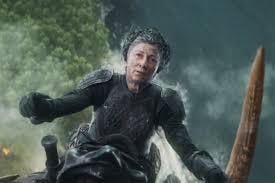The Inner Civil War In “House Of The Dragon” Continues To Be Toxic Masculinity
So, here’s the breakdown–this week’s episode continued to show the complexities of the Targaryen civil war.
This summer, I have found myself invested in the lore of “House of The Dragon.” I am yet to watch “Game of Thrones,” but the in-depth storytelling and often female lead narratives of this show drew me in. One of the main criticisms of the GoT universe is that brutal violence against women is often depicted and used as a plot device. While the show is intended to be a fictionalized version of the crimes present in real medieval Europe, viewers and critics continue to point out the tonal differences between GoT and “House of The Dragon,” which serves as a prequel that explores the intricacies of the Targaryen dynasty (led by Emilia Clarke’s Daenerys Targaryen in GoT.)
For those who are new here, here’s the breakdown. In short, the central conflict of this show is based in power, which in turn is determined by gender roles. That is until King Viserys (Paddy Considine) decides to name his eldest and only daughter Rhaenyra (Milly Alcock, and later Emma D’Arcy) as the heir to the coveted Iron Throne following the death of his wife and son in childbirth. A reluctant teenage Rhaenyra quickly grasps the power she has been handed, and accepts the honor with gratitude.
She becomes the first female heir in the entire dynasty, overstepping her uncle (and later husband, different times I know) who was disinherited over his violent behavior. In the years that follow, King Viserys succumbs to a leprosy like illness and dies, but not before his wife Allicent Hightower (Emily Carey and Olivia Cooke) misunderstands his dying wish and attempts to usurp the throne for their son Aegon (Tom Glynn Carney). Thus, civil war over who is the rightful heir to throne breaks out, and as the war continues, new secrets are revealed. This week episode four of season two aired.
Throughout the war, we see the men on either side (Team Black and Team Green) make rash and violent decisions, which often lead them astray from their goals or losing their loved ones. In the meantime, we continue to see the women’s wisdom serving as the true backbone of a fragile kingdom. Daemon, the aforementioned uncle husband to Rhaenyra, is locked up in a castle belonging to House Strong as he continues to forge allyship with them, haunted by visions of his past violence and treatment of women coming back to demand atonement.
Among these visions is one of a young Rhaenyra, saying “you created me Daemon, and now you’re set on destroying me all because your brother loved me more than you.” This line goes to show that Daemon’s emotionally stunted familial relationships and one sided view of women has contributed to his current situation–fighting a war for a wife who inadvertently usurped his power and still harbors resentment towards. His own powerful traits seemed like a positive thing to him, but he views them as negative in Rhaenyra, unable to associate them with a woman. It is for this reason he is so caught off guard by Alys, the illegitimate daughter of House Strong who appears to be the witchy architect of Daemon’s visions, and is not scared of him at all.
Later in the episode, as proven time and time again, Aegon is clearly unprepared for the responsibilities of power. He is barely fluent in the ancient language of his kingdom, he displays poor judgment in strategy, and his decision making is immature and rash. When he asks his mother what to do, Allicent tells him “nothing.” As the widow to the late King Viserys, Allicent knows all too well that the crown does not decide the fate of the world alone. She then asks him “do you think simply wearing the crown imbues you with wisdom?” This line felt so poignant, as Allicent herself was thrust into marriage at only 15 due to her father’s seat on the King’s counsel, and she has been forced to brutally learn from experience ever since.
Throughout this episode, Ser Criston Cole (Fabien Frankel) refers to Rhaenyra as a whore, and continues to invite criticism from Team Black over his rhetoric about women in power and willingness to spread misinformation. It is very clear that his personal stake in the war is Rhaenyra turning down his marriage proposal years ago. Cole’s toxic masculinity is rooted in his religious trauma and lack of understanding for Rhaenyra’s autonomy.
On Team Black, Rhaenyra delivers a powerful speech on the difference between inviting fear versus respect from the kingdom. Despite warnings from her son Jace and her counsel, Rhaenyra has remained steadfast in her desire to analyze and broker peace in place of war. When war becomes inevitable, she tells the counsel “there are those who have mistaken my caution for weakness. Let that be their own doing.” For centuries, women’s power has been demeaned throughout history (and so it seems the same in the GoT universe) and Rhaneyra’s power goes to show that strength can also lie in softness and compassion. Viewers see this plenty when she continues to prioritize the lives of the children on both sides of the family wide civil war.
As the season continues, the women continue to feel forced into these battles the men started. The civil war is much deeper than the crown, it cuts to the core of Westeros’ gender roles.







